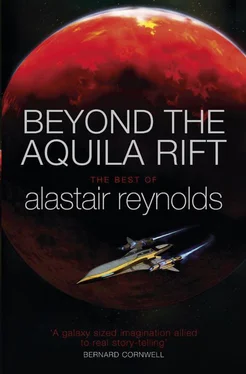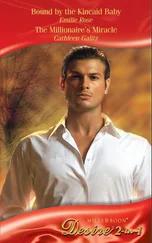THE STAR SURGEON’S APPRENTICE
THE ENERGETIC JONATHAN Strahan was assembling a collection of Young Adult science fiction stories entitled The Starry Rift and I was kindly approached to offer a story. I’d had the title in mind for a while, but not much an idea of what to do with it. Once I started writing, though, the action flowed more or less effortlessly and I had a great deal of fun with some of the gruesome details of this quasi-gothic-space-horror piece, which just happens to be another strange love story. Tonally, it’s quite similar to some of my Revelation Space pieces, but I think it would have been a struggle to shoehorn it into that universe, so I didn’t bother.
I’ve written a handful of stories for younger readers, and my approach is pretty much indistinguishable from my normal writing process. I just write the pieces and only then worry about the content. If a word, paragraph or scene needs to be changed here and there, fine, but I don’t set out with some vastly different structural methodology. Really I only know one way to write, and I’m still trying to get good at that .
THE SLEDGE-MAKER’S DAUGHTER
I SPENT THREE years of my life in Newcastle, on the Northeast coast of England. Newcastle is a wonderful, friendly city in a beautiful part of the country, with a history going back thousands of years. Once it marked the limit of Roman occupation, with only the unruly wilds of Scotland to the north, and the crumbling remains of Hadrian’s Wall still stir the imagination today. Years after my time in Newcastle, I found my imagination being drawn back to the River Tyne, only this time thousands of years in the future, after some climate-shifting catastrophe has thrown the world (or at least this part of it) into a mini ice-age. I’d been inspired by hearing about the Frost Fairs, those temporary encampments set up on the frozen Thames in the seventeenth and eighteenth centuries, and I started thinking about a kind of future Frost Fair, in which the barely understood goods of earlier eras and cultures might be bartered and admired. One of the things that always interests me in SF is the juxtaposition of past and future technologies and cultures. If you’ve read more than a little of my work you’ll have probably noticed the intrusion of Medieval symbols and imagery, from stained glass windows to cathedrals to resting knights on tombs. I was pleased with the way this story came out, especially as I was able to sell it to Interzone as my first submission to the magazine’s new editorial regime. I think I had vague intentions of digging deeper into this world, but so far there is just this one piece. Perhaps I need to go back to Newcastle.
DIAMOND DOGS
I WAS NEVER very good at it, but for a while I took up rock climbing. In fact it’s how I met my wife, who was also a keen (and incidentally much better) climber. Although I still enjoy hillwalking, I gave up on climbing itself, but I’ve never stopped being fascinated by reading about mountaineers and their exploits. In any given year, I can pretty much guarantee that one of the best books I’ll have read will be a mountaineering book. I also devour TV documentaries about Everest, K2, the Eiger and so on. It was while watching one of these programs that I started thinking about the peculiar allure of dangerous spaces, and the mentality that will bring a mountaineer back to a place year after year, even though it’s a kind of extended game of odds in which the stakes range from frostbite to severe injury or death. From that, it was only a hop and skip to a science fictional idea about an alien artefact that enacts a punishing toll on those who would dare to penetrate its mysteries, and yet which seems to have no end of volunteers ready to submit to its hazards.
This is well-trodden ground in SF, though, and I felt a conscious tip of the hat needed to be made to the seminal novel Rogue Moon , by the writer Algys Budrys. My story comes at the problem from a different angle, but there are thematic similarities, and I felt it was only honest to acknowledge the inspiration. I also threw in a couple of sly nods to the films Cube and Raiders of the Lost Ark . Perhaps I shouldn’t have been surprised that almost everyone gets those but almost no one gets the Rogue Moon reference.
I wrote the piece and felt that it had come out fairly well. But Peter Crowther, who’d commissioned it from me, felt that the ending could use an even darker twist. Peter suggested roughly where I might take it, and the result is unquestionably a much better story. I was reading Poe while I wrote this, by the way, as well as Robert Browning, and it pleases me that the David Bowie song of the same title also references Browning—but a quite different one.
THOUSANDTH NIGHT
THE EDITOR, ANTHOLOGIST and writer Gardner Dozois was one of the first figures in American SF to take any notice of my work, and I’ve been enormously grateful for his support and generosity ever since. Gardner was putting together a collection of long novellas set at least one million years in the future, and I was invited to contribute a piece.
Ever since I encountered Arthur C Clarke’s seminal The City and the Stars , I’ve loved reading and writing about the very far future. The Merlin stories take place a long time from today, but this was the chance to go really deep, and revel in the possibilities of immense spans of time and history, from a vantage point from which our own time is barely a geological sliver, if it’s remembered at all. For this piece, I homed in on an idea that had been floating around in my head for a while, that of some vast family reunion after a grand cycle of galactic exploration. The stellar engineering hinted at in this story is speculative, to say the least, but it isn’t completely without some basis in solid thinking—see, for instance, some of the wilder cosmological fancies in “Great Mambo Chicken and the Transhuman Condition”, by the science writer Ed Regis.
Later, I returned to the characters and basic premise of this story for the setting of my novel House of Suns , although the plots are quite different. Whether the one could be considered a distant prequel to the other, I’ll leave as an exercise for the reader.
TROIKA
THIS ONE WAS written for “Godlike Machines”, an anthology edited by Jonathan Strahan about alien artefacts and other such enigmatic mega-structures. It’s as good an example as I can think of how non-linear the creative process can be, and how it’s all but futile to impose some kind of ad-hoc narrative on the development of a story. I’d had a mental flash of a dark limousine driving through a blizzard, and scribbled an idea down onto a scrap of paper, something like “cosmonauts driven mad by Prokofiev” and left it at that. I then spent a couple of months chasing completely the wrong story up and down any number of trees and through any number of rabbit holes, before realising that it just wasn’t working. The abandoned piece didn’t have anything to do with blizzards or cosmonauts or Prokofiev. It was a hopelessly ambitious attempt to tell a story about an alien artefact that crashes into the Earth and undermines our technology and language, while at the same time reversing our sense of the flow of time, so what we think of the artefact’s arrival was actually its departure, and instead of perceiving a technological decline we perceived a technological acceleration…you get the idea. Or maybe you don’t. Trust me, it looked like a winner on the White Board.
At some point, frustrated by my failure to get this story off the ground, I walked away from it and realised I need to get back to something I actually had a chance of writing. That’s when I went back to the scribbled fragment and started writing Troika instead. This one wasn’t easy, either. There were setbacks and days when I couldn’t see my way through the thing. But what got me through it was a conviction that there was a way, if only I could find it, and that’s a crucial difference. I never had that with the earlier piece.
Читать дальше











